Updated on April 5th, 2022 by Bob Ciura
Spreadsheet data updated daily
Real estate investment trusts – or REITs, for short – can be fantastic securities for generating meaningful portfolio income. REITs widely offer higher dividend yields than the average stock.
While the S&P 500 Index on average yields less than 1.5% right now, it is relatively easy to find REITs with dividend yields of 5% or higher.
The following downloadable REIT list contains a comprehensive list of U.S. Real Estate Investment Trusts, along with metrics that matter including:
- Stock price
- Dividend yield
- Market capitalization
- 5-year beta
You can download your free 200+ REIT list (along with important financial metrics like dividend yields and payout ratios) by clicking on the link below:
In addition to the downloadable Excel sheet of all REITs, this article discusses why income investors should pay particularly close attention to this asset class. And, we also include our top 7 REITs today based on expected total returns.
Table Of Contents
In addition to the full downloadable Excel spreadsheet, this article covers our top 7 REITs today, as ranked using expected total returns from The Sure Analysis Research Database.
The table of contents below allows for easy navigation.
How To Use The REIT List To Find Dividend Stock Ideas
REITs give investors the ability to experience the economic benefits associated with real estate ownership without the hassle of being a landlord in the traditional sense.
Because of the monthly rental cashflows generated by REITs, these securities are well-suited to investors that aim to generate income from their investment portfolios. Accordingly, dividend yield will be the primary metric of interest for many REIT investors.
For those unfamiliar with Microsoft Excel, the following images show how to filter for REITs with dividend yields between 5% and 7% using the ‘filter’ function of Excel.
Step 1: Download the Complete REIT Excel Spreadsheet List at the link above.
Step 2: Click on the filter icon at the top of the ‘Dividend Yield’ column in the Complete REIT Excel Spreadsheet List.
Step 3: Use the filter functions ‘Greater Than or Equal To’ and ‘Less Than or Equal To’ along with the numbers 0.05 ad 0.07 to display REITs with dividend yields between 5% and 7%.
This will help to eliminate any REITs with exceptionally high (and perhaps unsustainable) dividend yields.
Also, click on ‘Descending’ at the top of the filter window to list the REITs with the highest dividend yields at the top of the spreadsheet.
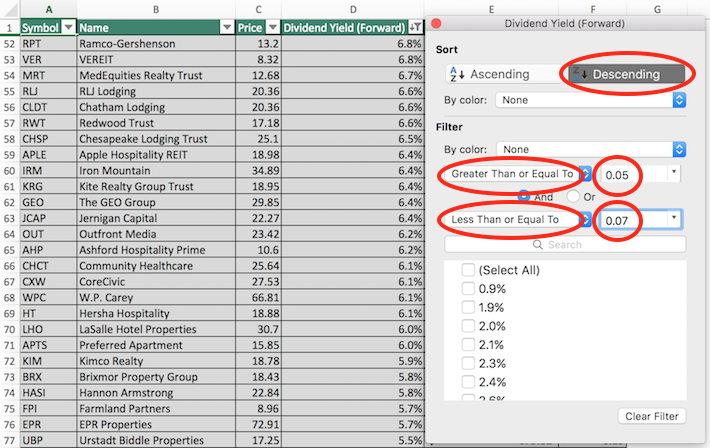
Now that you have the tools to identify high-quality REITs, the next section will show some of the benefits of owning this asset class in a diversified investment portfolio.
Why Invest in REITs?
REITs are, by design, a fantastic asset class for investors looking to generate income.
Thus, one of the primary benefits of investing in these securities is their high dividend yields.
The currently high dividend yields of REITs is not an isolated occurrence. In fact, this asset class has traded at a higher dividend yield than the S&P 500 for decades.
Related: Dividend investing versus real estate investing.
The high dividend yields of REITs are due to the regulatory implications of doing business as a real estate investment trust.
In exchange for listing as a REIT, these trusts must pay out at least 90% of their net income as dividend payments to their unitholders (REITs trade as units, not shares).
Sometimes you will see a payout ratio of less than 90% for a REIT, and that is likely because they are using funds from operations, not net income, in the denominator for REIT payout ratios (more on that later).
REIT Financial Metrics
REITs run unique business models. More than the vast majority of other business types, they are primarily involved in the ownership of long-lived assets.
From an accounting perspective, this means that REITs incur significant non-cash depreciation and amortization expenses.
How does this affect the bottom line of REITs?
Depreciation and amortization expenses reduce a company’s net income, which means that sometimes a REIT’s dividend will be higher than its net income, even though its dividends are safe based on cash flow.
Related: How To Value REITs
To give a better sense of financial performance and dividend safety, REITs eventually developed the financial metric funds from operations, or FFO.
Just like earnings, FFO can be reported on a per-unit basis, giving FFO/unit – the rough equivalent of earnings-per-share for a REIT.
FFO is determined by taking net income and adding back various non-cash charges that are seen to artificially impair a REIT’s perceived ability to pay its dividend.
For an example of how FFO is calculated, consider the following net income-to-FFO reconciliation from Realty Income (O), one of the largest and most popular REIT securities.
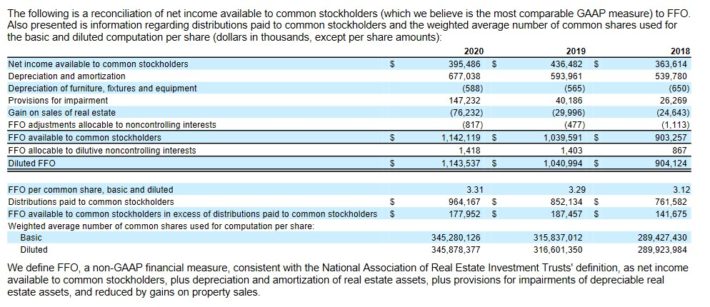
Source: Realty Income Annual Report
In 2020, net income was $395 million while FFO available to stockholders was above $1.1 billion, a sizable difference between the two metrics. This shows the profound effect that depreciation and amortization can have on the GAAP financial performance of real estate investment trusts.
The Top 7 REITs Today
Below we have ranked our top 7 REITs today based on expected total returns.
Expected total returns are in turn made up from dividend yield, expected growth on a per unit basis, and valuation multiple changes. Expected total return investing takes into account income (dividend yield), growth, and value.
Note: The REITs below have not been vetted for safety. These are high expected total return securities, but they may come with elevated risks.
We encourage investors to fully consider the risk/reward profile of these investments.
For the Top 10 REITs each month with 4%+ dividend yields, based on expected total returns and safety, see our Top 10 REITs service.
Top REIT #7: Clipper Realty Inc. (CLPR)
- Expected Total Return: 13.7%
- Dividend Yield: 4.2%
Clipper Properties is a Real Estate Investment Trust, or REIT, that was founded by the merger of four pre-existing real estate companies. The founders retain about 2/3 of the ownership and votes today as they have never sold a share, thereby causing some corporate governance concerns but also giving investors knowledge that the insiders are heavily incentivized to look out for shareholder interests. Clipper Properties owns commercial (primarily multifamily and office with a small sliver of retail) real estate across New York City.
On March 15th, Clipper Properties released fourth quarter results. Q4 revenue stood at $30.8 million, up by 1.6% from $30.3 million in the year-ago period. Income from operations stood at $4.1 million, down from $6.5 million in the yearago period. Net operating income increased to $16.4 million from $14.7 million year-over-year. Moreover, AFFO increased to $4.4 million from $3.0 million in the year-ago period. Meanwhile, the company reported a net loss of $6.2 million during the quarter.
Click here to download our most recent Sure Analysis report on Clipper Realty (preview of page 1 of 3 shown below).
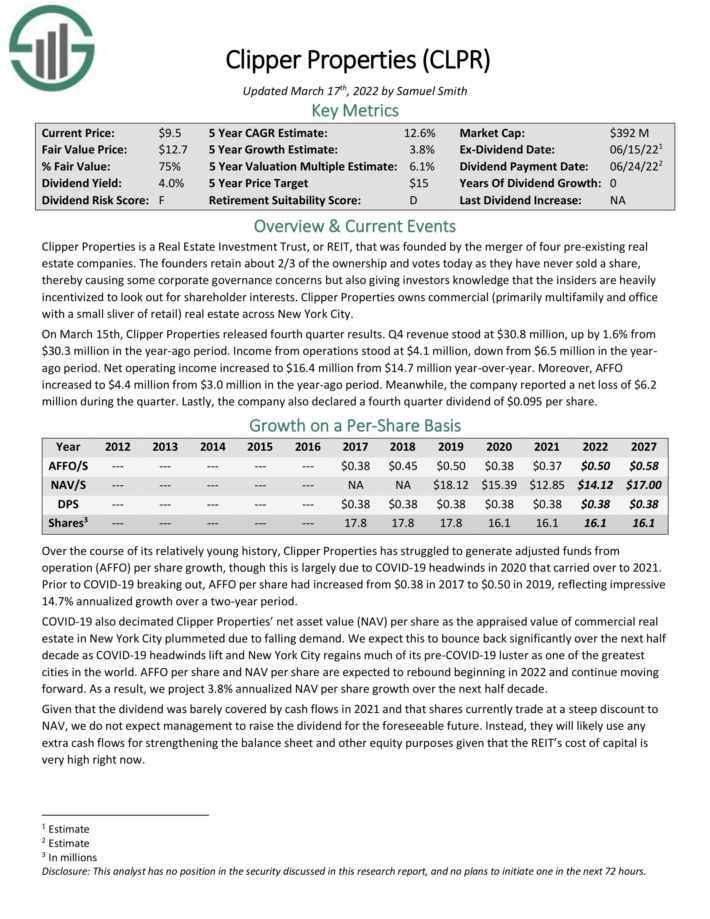
Top REIT #6: National Storage Affiliates Trust (NSA)
- Expected Total Return: 13.8%
- Dividend Yield: 3.2%
National Storage Affiliates Trust is a self–administered and self–managed real estate investment trust specializing in the operation and acquisition of self–storage properties located within the top 100 metropolitan statistical areas throughout the United States and Puerto Rico.
The trust owns 873 consolidated self–storage properties in 39 states and Puerto Rico with approximately 55.1 million rentable square feet. Through its property management platform, the trust also manages an additional portfolio of 177 properties owned by its unconsolidated real estate ventures. NSA owns a 25% equity interest in each of its unconsolidated real estate ventures. NSA generates around $585 million in annual revenues.
On February 24th, 2022, National Storage Affiliates reported its Q4 results for the period ending December 31st, 2021. Total revenues came in at $173.6 million, 52.1% higher year-over-year. The jump in revenues was attributable to higher rental revenues following accretive acquisitions and higher management fees. Specifically, during the quarter, NSA acquired 110 self–storage properties for $1.1 billion.
Core FFO-per-share grew by 39.1% to $0.64 due to the additional shares issued to partially fund the trust’s acquisitions. At the end of the quarter, occupancy stood at 95.5%, an increase of 360 basis points compared to Q4–2020. Following robust momentum and accretive earnings growth powered by last year’s acquisitions, management now expects core FFO/share to land between $2.68 and $2.74 in FY2022.
Click here to download our most recent Sure Analysis report on NSA (preview of page 1 of 3 shown below).

Top REIT #5: Two Harbors Investment Corp. (TWO)
- Expected Total Return: 14.3%
- Dividend Yield: 12.8%
Two Harbors Investment Corp. is a residential mortgage real estate investment trust (mREIT). As such, it focuses on residential mortgage–backed securities (RMBS), residential mortgage loans, mortgage servicing rights, and commercial real estate.
The trust derives nearly all of its revenue in the form of interest through available–for–sale securities.
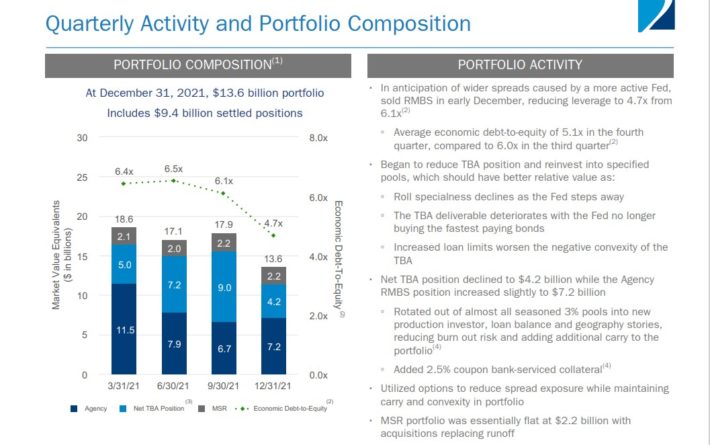
Source: Investor Presentation
In early February (02/09/22), Two Harbors reported financial results for the fourth quarter. Quarterly earnings-per-share came in at $0.22. Book value per share stood at $5.87, representing a (5.6)% quarterly return on book value.
Two Harbors settled $17 billion unpaid principal balance of MSR through its MSR flow-sale program and foresees to settle on additional commitments of $22 billion UPB of MSR through bulk transactions in Q1 2022.
The company’s total portfolio of $13.6 billion fell from $17.9 billion quarter-over-quarter due to the impact of spread widening and higher volatility during the quarter. Moreover, the company reported a comprehensive loss of $128.6 million representing (24.7)% annualized return on average common equity.
Meanwhile, annualized yield for the aggregate portfolio during the quarter was 2.99% compared with 2.55% in Q3, while servicing income for the quarter increased to $125.5 million from $123.0 million in Q3. Total interest income stood at $33.0 million, down from $72.5 million in the year-ago period.
Click here to download our most recent Sure Analysis report on Two Harbors (TWO) (preview of page 1 of 3 shown below).
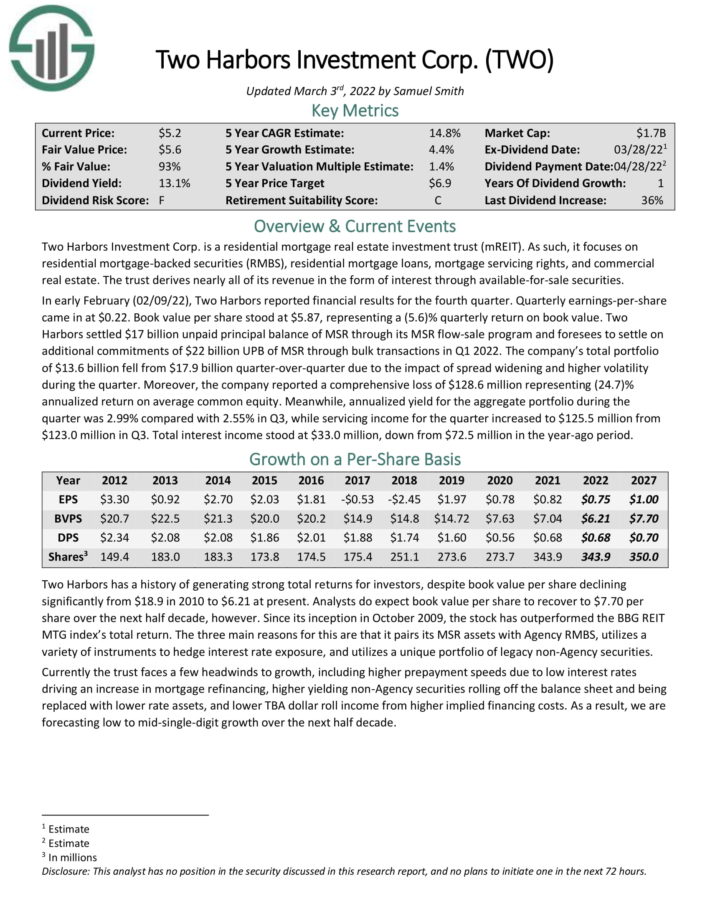
Top REIT #4: AGNC Investment Corp. (AGNC)
- Expected Total Return: 15.7%
- Dividend Yield: 11.0%
American Capital Agency Corp was founded in 2008, and is a mortgage real estate investment trust that invests primarily in agency mortgage-backed securities (or MBS) on a leveraged basis.
The firm’s asset portfolio is comprised of residential mortgage pass-through securities, collateralized mortgage obligations (or CMO), and non-agency MBS. Many of these are guaranteed by government sponsored enterprises.
The majority of American Capital’s investments are fixed rate agency MBS. Most of these are MBS with a 30-year maturity period.
AGNC derives nearly all its revenue in the form of interest income. It currently generates $1.2 billion in annual net revenue and trades at a market capitalization of $7.5 billion.
AGNC reported its Q4 2021 results on January 31, 2022. Q4 net spread and dollar roll income per share stood at 75 cents. Tangible net book value increased to $15.75 from $16.41 quarter-over-quarter.
The company also announced dividends per common share of $0.36 for the fourth quarter while economic return on tangible common equity came in at -1.8%. Meanwhile, the company’s investment portfolio at quarter end stood at $82 billion.
We expect 15.7% annual returns for AGNC, made up of the 11.0% dividend yield, no growth, and a ~4.7% boost from a rising P/FFO multiple.
Click here to download our most recent Sure Analysis report on AGNC (preview of page 1 of 3 shown below):
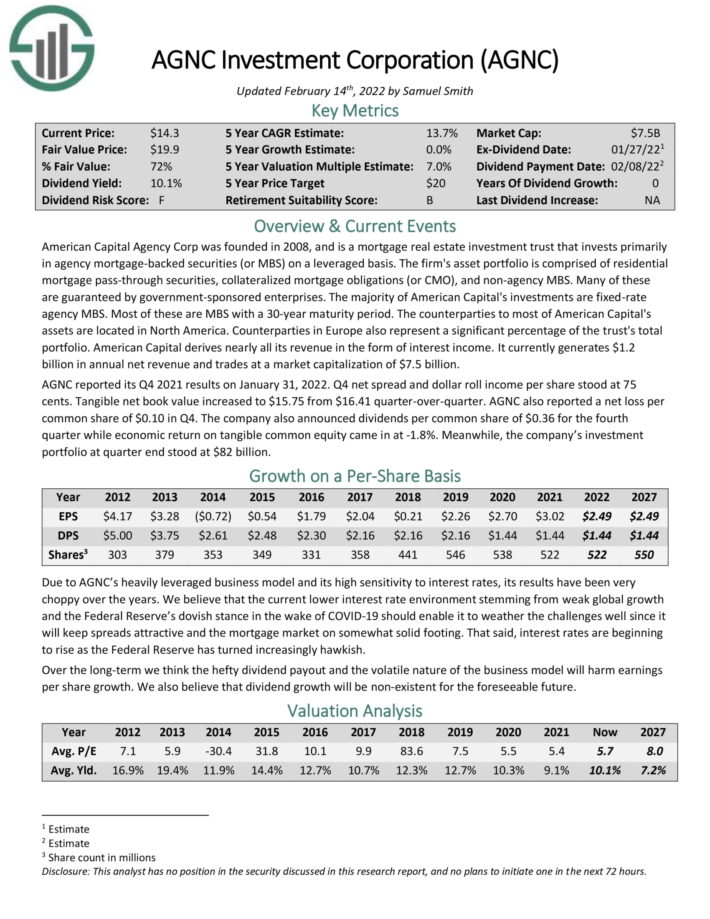
Top REIT #3: Orchid Island Capital (ORC)
- Expected Total Return: 18.5%
- Dividend Yield: 16.6%
Orchid Island Capital, Inc. is a REIT operating in the mortgage industry. Mortgage REITs differ from most other REITs.
For example, traditional REITs typically own a portfolio of physical real estate, which they lease to tenants to collect rental income. Mortgage REITs are purely financial entities, and Orchid Island does not own any physical properties.
Instead, it is an externally managed REIT (by Bimini Advisors LLC) that invests in residential mortgage–backed securities (RMBS), either pass-through or structured agency RMBSs, which are financial instruments that collect cash flow based on residential loans such as mortgages, including subprime, and home-equity loans.
ORC recently cut its dividend by 18%, although the stock still yields 16.6%.
We expect annual returns of 18.5% for ORC stock, driven by the 16.6% dividend yield and a small amount of business growth.
Click here to download our most recent Sure Analysis report on ORC (preview of page 1 of 3 shown below):
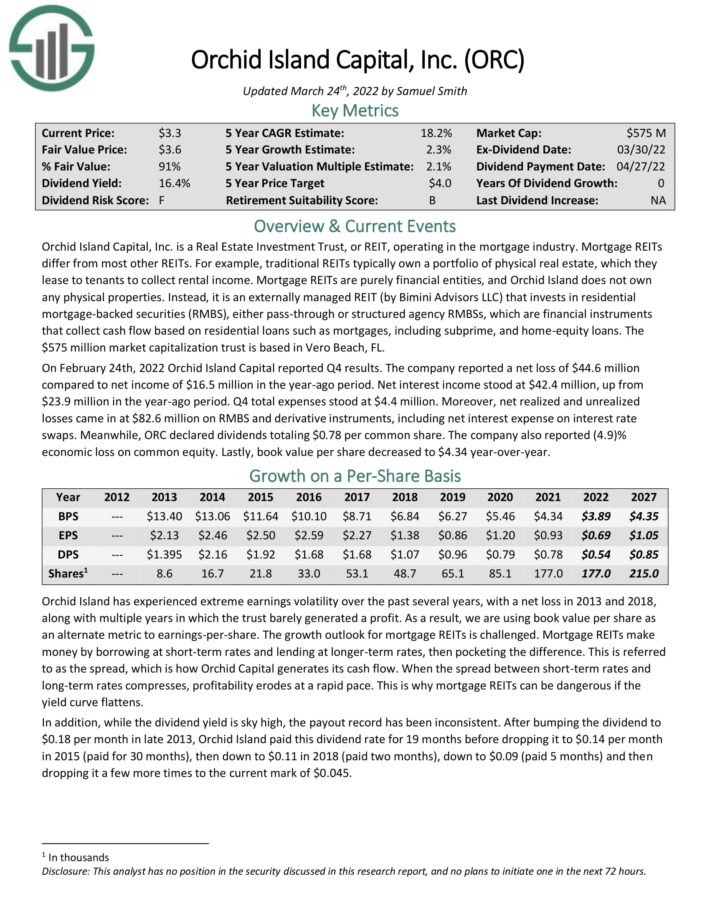
Top REIT #2: Safehold Inc. (SAFE)
- Expected Total Return: 16.1%
- Dividend Yield: 1.2%
Safehold is a ground lease REIT that aspires to revolutionize the real estate industry by providing a more capital efficient way for businesses to own buildings for their businesses.
The trust engages in long–term sale and leasebacks of land underneath commercial properties across the United States and is the only REIT focused entirely on ground leases to support real estate investment and development.
The company has generated strong growth since its IPO.
Safehold is a low-yielding REIT with a dividend yield of 1.2%, but we expect a high growth rate of 12% per year. The stock appears overvalued, but we still see the potential for annual returns above 16% per year over the next five years.
Click here to download our most recent Sure Analysis report on SAFE (preview of page 1 of 3 shown below).

Top REIT #1: Innovative Industrial Properties, Inc. (IIPR)
- Expected Total Return: 20.8%
- Dividend Yield: 3.4%
Innovative Industrial Properties, Inc. is a single-use “specialty REIT” that exclusively focuses on owning properties used for the cultivation and production of cannabis.
Because the industry is in the midst of a legal transition, there are constraints on capital available to businesses engaged in the cannabis business. Innovative Industrial Properties owns 105 properties in 19 states.
Having the fortunate status as the only publicly traded cannabis REIT in the US has led to stunning returns, and growth.
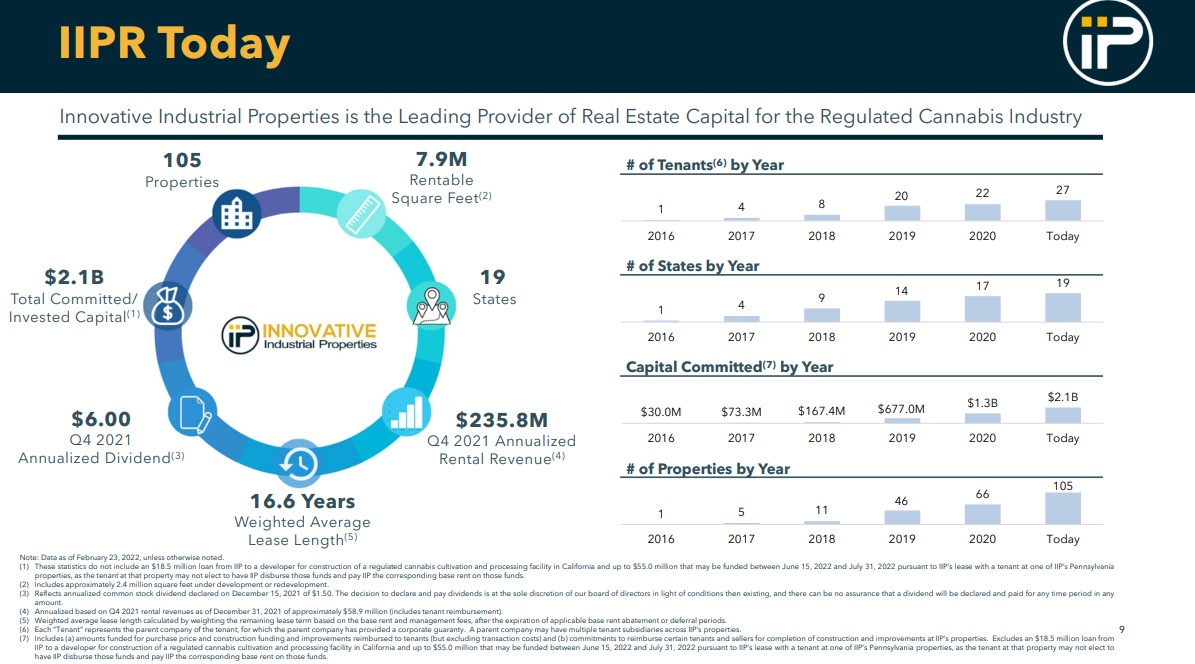
Source: Investor Presentation
On February 23rd, 2022, Innovative Industrial announced its Q4 earnings for the period ending December 31st, 2021. For the quarter, revenues and normalized AFFO/share were $58.9 million and $1.85, an increase of 59%, and 42.3%, respectively. These rates even accelerated from Q3’s 56.9% and 33.6%, respectively.
The company delivered another quarter of very high growth, with another 31 acquisitions since the beginning of October and contractual rental escalations at certain properties. As of February 23rd, 100% of IIPR’s properties were leased with a weighted–average remaining lease term of approximately 16.6 years, close to the previous quarter, which is once again very impressive.
With its tenants enjoying resilient marijuana demand amid growing consumption, IIPR once again collected 100% of its contractual rent due for Q4.
Click here to download our most recent Sure Analysis report on Innovative Industrial Properties (preview of page 1 of 3 shown below):
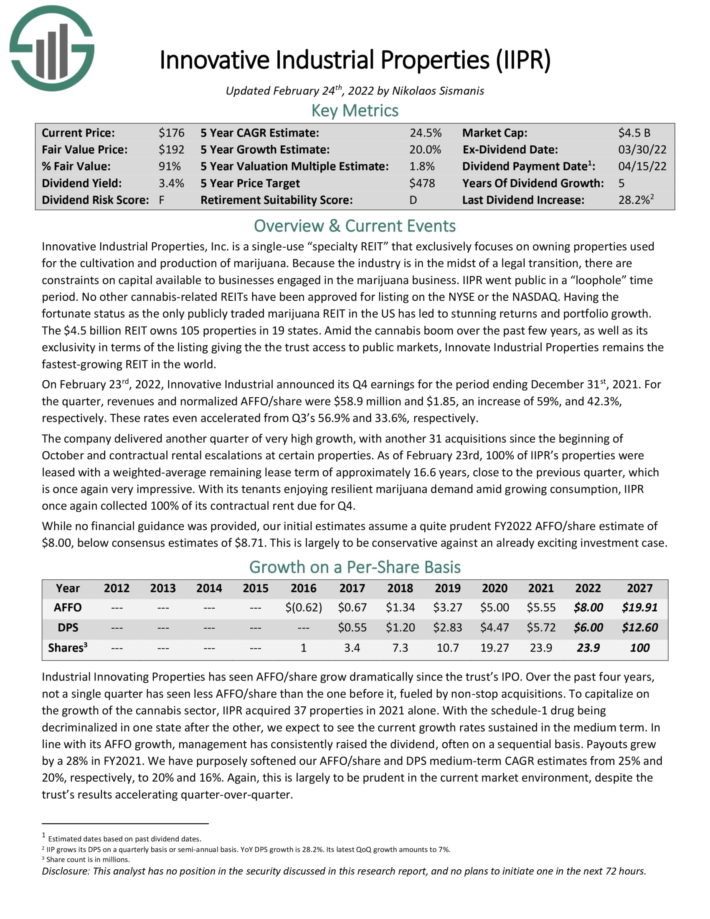
Final Thoughts
The REIT Spreadsheet list in this article contains a list of publicly-traded Real Estate Investment Trusts.
However, this database is certainly not the only place to find high-quality dividend stocks trading at fair or better prices.
In fact, one of the best methods to find high-quality dividend stocks is looking for stocks with long histories of steadily rising dividend payments. Companies that have increased their payouts through many market cycles are highly likely to continue doing so for a long time to come.
You can see more high-quality dividend stocks in the following Sure Dividend databases, each based on long streaks of steadily rising dividend payments:
Alternatively, another great place to look for high-quality business is inside the portfolios of highly successful investors. By analyzing the portfolios of legendary investors running multi-billion dollar investment portfolios, we are able to indirectly benefit from their million-dollar research budgets and personal investing expertise.
To that end, Sure Dividend has created the following two articles:
You might also be looking to create a highly customized dividend income stream to pay for life’s expenses.
The following lists provide useful information on high dividend stocks and stocks that pay monthly dividends:
Bonus: Listen to our interview with Brad Thomas on The Sure Investing Podcast about intelligent REIT investing in the below video.
Thanks for reading this article. Please send any feedback, corrections, or questions to [email protected].


